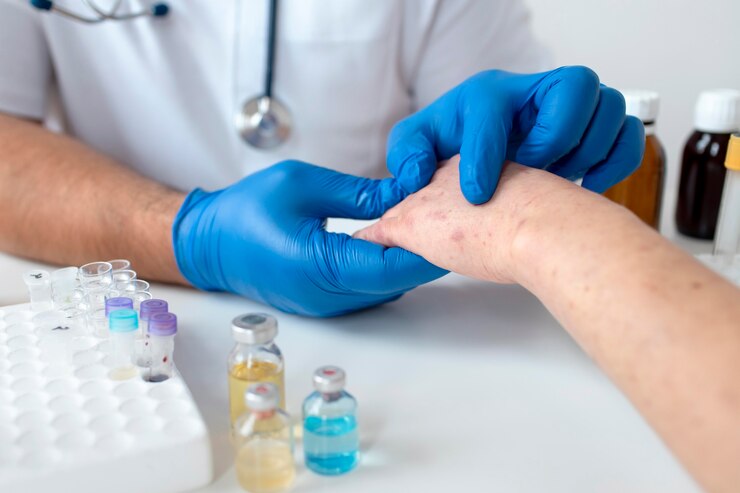Skin infections treatment

Skin infections can vary in severity, and their treatment depends on the type of infection and its cause. Here are some general treatments for common skin infections:
1. Bacterial Infections (e.g., Impetigo, Cellulitis, Folliculitis)
- Antibiotics: These are typically prescribed for bacterial infections. You might be given topical antibiotics (such as mupirocin for localized infections) or oral antibiotics (such as amoxicillin or cephalexin) for more widespread infections.
- Proper Hygiene: Wash the infected area with mild soap and water to reduce bacterial load.
- Cover the Area: Protect the infected area with a sterile bandage to prevent the spread of infection and avoid touching it.
2. Fungal Infections (e.g., Ringworm, Athlete’s Foot, Candida)
- Antifungal Creams: Over-the-counter antifungal creams, such as clotrimazole, miconazole, or terbinafine, can treat fungal infections.
- Oral Antifungals: For more severe or widespread fungal infections, a doctor may prescribe oral antifungals like fluconazole or itraconazole.
- Good Hygiene: Keep the infected area dry and clean. Fungi thrive in moist environments, so use talcum powder or antifungal powder to absorb moisture.
3. Viral Infections (e.g., Herpes Simplex, Shingles)
- Antiviral Medications: For viral infections like herpes or shingles, antiviral medications like acyclovir or valacyclovir can help reduce the severity and duration of symptoms.
- Pain Relief: Over-the-counter pain relievers like ibuprofen or acetaminophen can help alleviate pain and inflammation.
- Topical Creams: For herpes sores, you may use topical antiviral creams to alleviate pain and promote healing.
4. Parasitic Infections (e.g., Scabies, Lice)
- Topical Treatments: Scabies can be treated with topical scabicide lotions, such as permethrin or crotamiton. Lice can be treated with lice-killing shampoos or lotions containing permethrin or pyrethrin.
- Clean Clothing and Bedding: Wash clothes, towels, and bedding in hot water and dry on high heat to eliminate any parasites or eggs.
- Itch Relief: Antihistamines or corticosteroid creams may help reduce itching.
5. Abscesses and Boils
- Incision and Drainage: Sometimes, abscesses or boils need to be drained by a healthcare provider to relieve pressure and remove pus.
- Antibiotics: Oral antibiotics may be prescribed if there is a risk of spreading infection.
General Tips:
- Avoid Scratching: Scratching can spread the infection or worsen the condition.
- Keep the Area Clean: Gently cleanse the affected area with soap and water.
- Consult a Doctor: If the infection is severe, spreading rapidly, or not improving with over-the-counter treatments, see a healthcare provider for an accurate diagnosis and treatment plan.
